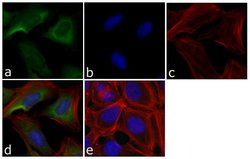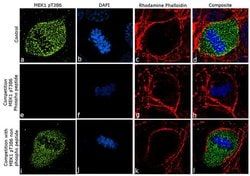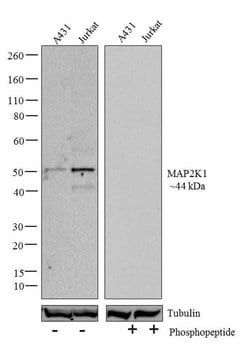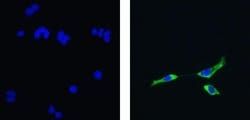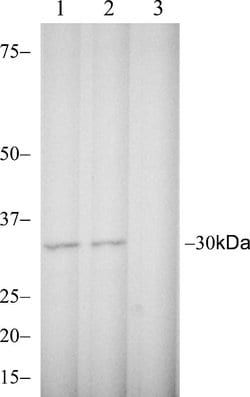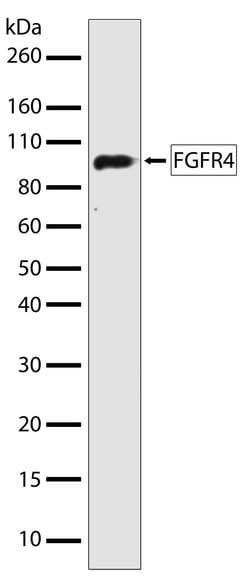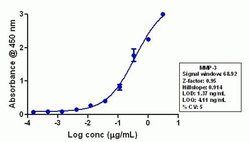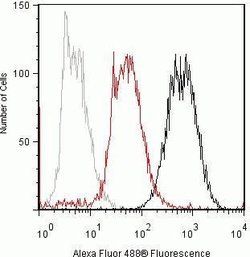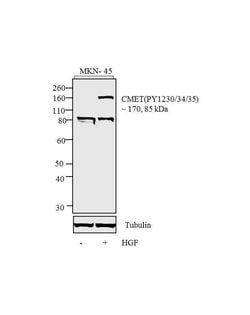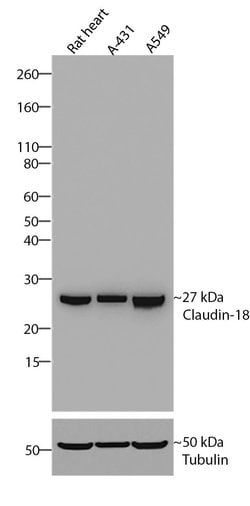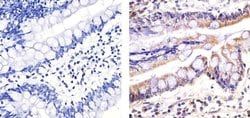TAK1 Recombinant Rabbit Monoclonal Antibody (28H25L68), Invitrogen™
Manufacturer: Thermo Scientific
Select a Size
| Pack Size | SKU | Availability | Price |
|---|---|---|---|
| Each of 1 | PI700113-Each-of-1 | In Stock | ₹ 49,662.00 |
PI700113 - Each of 1
In Stock
Quantity
1
Base Price: ₹ 49,662.00
GST (18%): ₹ 8,939.16
Total Price: ₹ 58,601.16
Antigen
TAK1
Classification
Recombinant Monoclonal
Concentration
0.5 mg/mL
Formulation
PBS with 0.09% sodium azide
Gene Accession No.
O43318, P0C8E4, Q62073
Gene Symbols
MAP3K7
Immunogen
A recombinant protein corresponding to amino acids 476-606 of O43318.
Quantity
100 μg
Primary or Secondary
Primary
Target Species
Human, Mouse, Rat
Product Type
Antibody
Isotype
IgG
Applications
Flow Cytometry, Immunocytochemistry, Western Blot
Clone
28H25L68
Conjugate
Unconjugated
Gene
MAP3K7
Gene Alias
B430101B05; C87327; hypothetical protein LOC553788; I79_000697; M3K7; map3k7; map3k7.L; MAPKKK; MEKK7; mitogen activated protein kinase kinase kinase 7; mitogen-activated protein kinase kinase kinase 7; mitogen-activated protein kinase kinase kinase 7 L homeolog; RP1-154G14.1; si:ch211-225h9.1; Tak1; TAK1z; TGF1a; TGF-beta activated kinase 1; TGF-beta-activated kinase 1; TGF-beta-activated kinase TAK1; transforming growth factor beta-activated kinase 1; transforming growth factor-beta-activated kinase 1; XELAEV_18027270mg; xTAK1; zgc:110612
Host Species
Rabbit
Purification Method
Protein A
Regulatory Status
RUO
Gene ID (Entrez)
26409, 313121, 6885
Content And Storage
Store at 4°C short term. For long term storage, store at -20°C, avoiding freeze/thaw cycles.
Form
Liquid
Related Products
Description
- This antibody is predicted to react with Rhesus monkey, orangutan, chimpanzee, mouse, rat, equine, porcine, bovine, chicken, Xenopus and zebrafish based on sequence homology
- Intact IgG appears on a non-reducing gel as ∽150 kDa band and upon reduction generating a ∽25 kDa light chain band and a ∽50 kDa heavy chain
- Recombinant rabbit monoclonal antibodies are produced using in vitro expression systems
- The expression systems are developed by cloning in the specific antibody DNA sequences from immunoreactive rabbits
- Then, individual clones are screened to select the best candidates for production
- The advantages of using recombinant rabbit monoclonal antibodies include: better specificity and sensitivity, lot-to-lot consistency, animal origin-free formulations, and broader immunoreactivity to diverse targets due to larger rabbit immune repertoire
- TAK1 (also known as MAP3K7), a part of the serine/threonine kinase family, is a versatile protein with many signaling functions
- Originally identified as a TGF- beta-activated kinase, TAK1 interacts with TGF- beta-receptor and TRAF6 to modulate TGF- beta activation of JNK and p38
- It has additional roles in activation of p38 and JNK through Wnt, BMP, and activin signaling pathways as well in response to thyroid hormone, osmotic stress, endothelin, and ephrine
- Through activation of von Hippel-Lindau tumor suppressor expression, TAK1 represses PDGF-B, integrin beta1 and integrin beta5, promoting proper wound healing
- TAK1 also plays an essential role in IKK activation in numerous signaling pathways including IL-1, IL-6, IL-18, TNF, CD40, TLR, and RIG-I
- Activation of the TAK1-IKK pathway requires TAB2/3 and ubiquitination
- In this process, TAB2/3 binds to the C-terminal region of TAK1 and becomes polyubiquitinated, TAK1 is autophosphorylated at Thr178, Thr184, Thr187 and Ser192, and finally TAK1 phosphorylates IKK- beta
- Additionally, TAK1 represses human telomerase reverse transcriptase suggesting a role in regulation of cell lifespan.
